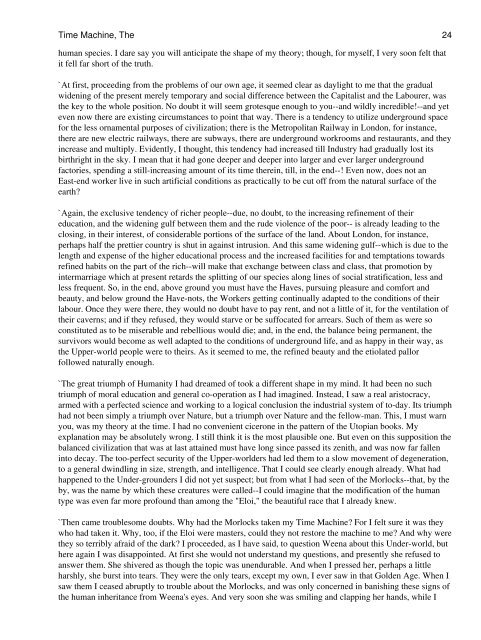90372697623
Create successful ePaper yourself
Turn your PDF publications into a flip-book with our unique Google optimized e-Paper software.
Time Machine, The 24<br />
human species. I dare say you will anticipate the shape of my theory; though, for myself, I very soon felt that<br />
it fell far short of the truth.<br />
`At first, proceeding from the problems of our own age, it seemed clear as daylight to me that the gradual<br />
widening of the present merely temporary and social difference between the Capitalist and the Labourer, was<br />
the key to the whole position. No doubt it will seem grotesque enough to you--and wildly incredible!--and yet<br />
even now there are existing circumstances to point that way. There is a tendency to utilize underground space<br />
for the less ornamental purposes of civilization; there is the Metropolitan Railway in London, for instance,<br />
there are new electric railways, there are subways, there are underground workrooms and restaurants, and they<br />
increase and multiply. Evidently, I thought, this tendency had increased till Industry had gradually lost its<br />
birthright in the sky. I mean that it had gone deeper and deeper into larger and ever larger underground<br />
factories, spending a still-increasing amount of its time therein, till, in the end--! Even now, does not an<br />
East-end worker live in such artificial conditions as practically to be cut off from the natural surface of the<br />
earth?<br />
`Again, the exclusive tendency of richer people--due, no doubt, to the increasing refinement of their<br />
education, and the widening gulf between them and the rude violence of the poor-- is already leading to the<br />
closing, in their interest, of considerable portions of the surface of the land. About London, for instance,<br />
perhaps half the prettier country is shut in against intrusion. And this same widening gulf--which is due to the<br />
length and expense of the higher educational process and the increased facilities for and temptations towards<br />
refined habits on the part of the rich--will make that exchange between class and class, that promotion by<br />
intermarriage which at present retards the splitting of our species along lines of social stratification, less and<br />
less frequent. So, in the end, above ground you must have the Haves, pursuing pleasure and comfort and<br />
beauty, and below ground the Have-nots, the Workers getting continually adapted to the conditions of their<br />
labour. Once they were there, they would no doubt have to pay rent, and not a little of it, for the ventilation of<br />
their caverns; and if they refused, they would starve or be suffocated for arrears. Such of them as were so<br />
constituted as to be miserable and rebellious would die; and, in the end, the balance being permanent, the<br />
survivors would become as well adapted to the conditions of underground life, and as happy in their way, as<br />
the Upper-world people were to theirs. As it seemed to me, the refined beauty and the etiolated pallor<br />
followed naturally enough.<br />
`The great triumph of Humanity I had dreamed of took a different shape in my mind. It had been no such<br />
triumph of moral education and general co-operation as I had imagined. Instead, I saw a real aristocracy,<br />
armed with a perfected science and working to a logical conclusion the industrial system of to-day. Its triumph<br />
had not been simply a triumph over Nature, but a triumph over Nature and the fellow-man. This, I must warn<br />
you, was my theory at the time. I had no convenient cicerone in the pattern of the Utopian books. My<br />
explanation may be absolutely wrong. I still think it is the most plausible one. But even on this supposition the<br />
balanced civilization that was at last attained must have long since passed its zenith, and was now far fallen<br />
into decay. The too-perfect security of the Upper-worlders had led them to a slow movement of degeneration,<br />
to a general dwindling in size, strength, and intelligence. That I could see clearly enough already. What had<br />
happened to the Under-grounders I did not yet suspect; but from what I had seen of the Morlocks--that, by the<br />
by, was the name by which these creatures were called--I could imagine that the modification of the human<br />
type was even far more profound than among the "Eloi," the beautiful race that I already knew.<br />
`Then came troublesome doubts. Why had the Morlocks taken my Time Machine? For I felt sure it was they<br />
who had taken it. Why, too, if the Eloi were masters, could they not restore the machine to me? And why were<br />
they so terribly afraid of the dark? I proceeded, as I have said, to question Weena about this Under-world, but<br />
here again I was disappointed. At first she would not understand my questions, and presently she refused to<br />
answer them. She shivered as though the topic was unendurable. And when I pressed her, perhaps a little<br />
harshly, she burst into tears. They were the only tears, except my own, I ever saw in that Golden Age. When I<br />
saw them I ceased abruptly to trouble about the Morlocks, and was only concerned in banishing these signs of<br />
the human inheritance from Weena's eyes. And very soon she was smiling and clapping her hands, while I

















